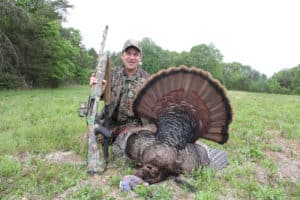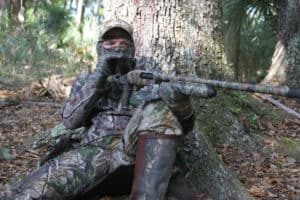By David Hart
The clock is ticking. In just a few weeks or even a few days, you’ll watch the sun set on another turkey season.

Bagging a late-season gobbler is far from impossible. Hunting pressure is lighter, and with hens going to nest, some gobblers are more fired up than during the early season.
You can keep doing what you’ve done all season or you can make a change in your tactics so drastic your buddies might think you’ve spent too much time in the woods.
Kick It Up
You’ve spent the past few weeks calling softly, you’ve sat for hours and you’ve practiced every low-impact hunting method in the book. And you still have an unfilled turkey tag. In other words, those methods haven’t worked. Now what?
It’s time to throw the kitchen sink at them. Go big, go loud and go fast. As the breeding season winds down, it can take aggressive, loud calling to fire up a worn-out gobbler. They often won’t gobble much towards the end of the season, but a cackling, cutting and yelping hen just might fire them up enough to announce their location. All it takes is one gobble to give you a shot of confidence and a dose of hope that you might get a chance. There’s no guarantee it will work, but this time of year, you’ve got nothing to lose.
Don’t just stay in one spot, though. Cover some ground. Call loud, wait a few minutes and start walking. Go at least 100 yards and repeat the sequence. Travel ridges, field edges and other likely spots.
Tone It Down
Aggressive calling can work against you, especially on hard-hunted public land where countless hunters have yelped at the top of their lungs. Soft, quiet, subdued calling may be the answer in some situations.
Don’t just walk and call, though. Pressured birds have spent a season watching hunters walk through the woods, yelping, clucking and cutting as they go. They’ve learned to associate those sounds with danger. Instead, find a spot with good visibility, particularly one far from trails, parking areas and other high-traffic locations and sit. Call occasionally, but call softly. Real hens don’t call much and they rarely call at the top of their lungs. Besides, you’d be surprised at how far even a soft turkey call carries. Try scratching the leaves to imitate the sound of a turkey feeding.
Most important, stay ready. Keep your mask and gloves on and keep your gun propped up on your knee. Late-season gobblers often slip in quietly, never making a peep as they approach. Don’t get caught off-guard.
Sit and Wait
How long you stay in one spot depends on you and the turkeys. Can you sit for hours? You might need to. Turkeys may roam late in the season, but they usually aren’t in a hurry. Just because you haven’t seen a bird in 20 minutes doesn’t mean one isn’t working his way towards you.

Stay ready. Keep your mask and gloves on, and keep your gun propped up on your knee. Late-season gobblers often slip in quietly, never making a peep as they approach.
Don’t get frustrated if you don’t hear a gobble. The breeding season may be over. Gobblers don’t care about the hens around them and they aren’t interested in announcing their presence to all the other creatures in the woods. They just want to eat.
That’s why your best last-ditch hope might be to find a likely food source, set up a blind and wait. And wait some more. If you have the patience, you might get lucky and intercept a bird as he goes about his business.
There’s no telling where a gobbler might want to feed, but a safe bet is some sort of field that has abundant fresh greens. Food plots, especially perennial clover plots, are great choices. So are pastures. Turkeys tend to avoid tall grass, but they will feed along the edges where new green growth and insects are abundant.
There’s nothing wrong with tossing out a few soft yelps now and then. You might trigger a reaction gobble or you might find a late-season breeder. In other words, the secret to last-ditch turkey hunting is to spend as much time in the woods as you can. Things may be a bit tougher this time of year, but you can’t fill that last tag if you don’t try.
The Union Sportsmen’s Alliance website is designed to provide valuable articles about hunting, fishing and conservation for members of AFL-CIO affiliated labor unions and all sportsmen and sportswomen who appreciate hunting and fishing and want to preserve our outdoor heritage for future generations. If you would like your own story and experience from the outdoors to be considered for our website, please email us at [email protected].








